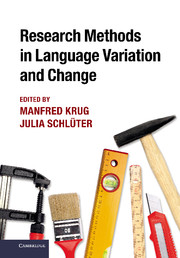15 - Combining elicitation data with corpus data
Published online by Cambridge University Press: 05 June 2014
Summary
Introduction
Studies of grammatical variation often tend to focus on one particular method, usually the one with an affinity to the specific field of linguistics or linguistic framework that the researcher works in (see Krug, Rosenbach and Schlüter, Introduction, this volume). The present article argues for the merits of combining evidence from different methods (‘converging evidence’) when studying grammatical variation rather than focussing on one data source alone. Underlying this approach is the idea that there is no privileged type of data or method in the study of grammatical variation, and that results from whatever method applied will be strengthened by results obtained from another method. In the following, I will demonstrate how elicited data and corpus data can be combined to get converging evidence on a particularly notorious problem in studies of grammatical variation, namely the problem of factor interaction, which I will exemplify on the basis of an earlier case study on English genitive variation (Rosenbach 2005).
The problem of factor correlation
The phenomenon of grammatical variation refers to the fact that speakers often have various forms/constructions at their disposal to express essentially the same (propositional) meaning. One of the greatest obstacles encountered by researchers on grammatical variation is the presence of various, often highly correlating factors determining the choice of variants. Take the example of English genitive variation, i.e. the variation between s-genitives, as in the king's daughter, and of-genitives, as in the daughter of the king. The choice between the two is determined by a variety of factors, of which I mention only some of the most important ones (see e.g. Altenberg 1982; Jucker 1993; Anschutz 1997; Rosenbach 2002, 2005; O'Connor et al. 2004; Hinrichs and Szmrecsanyi 2007). For example, the s-genitive is preferred when the possessor is:
(a) animate (preferably human),
(b) given (or topical),
(c) short,
(d) high in referentiality (e.g. as a proper noun), or
(e) if the possessive relation expressed is a prototypical one for possession.
Information
- Type
- Chapter
- Information
- Research Methods in Language Variation and Change , pp. 278 - 294Publisher: Cambridge University PressPrint publication year: 2013
References
Accessibility standard: Unknown
Why this information is here
This section outlines the accessibility features of this content - including support for screen readers, full keyboard navigation and high-contrast display options. This may not be relevant for you.Accessibility Information
- 2
- Cited by
